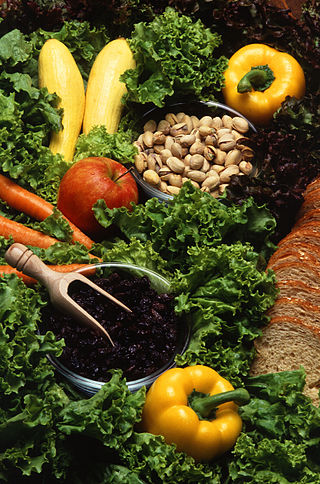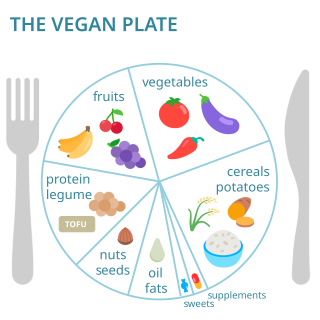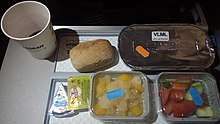
Veganism is the practice of abstaining from the use of animal products—particularly in diet—and an associated philosophy that rejects the commodity status of animals. A person who follows the diet or philosophy is known as a vegan.

Vegetarianism is the practice of abstaining from the consumption of meat. It may also include abstaining from eating all by-products of animal slaughter.

Vegetarian cuisine is based on food that meets vegetarian standards by not including meat and animal tissue products.

A lacto-vegetarian diet is a diet that abstains from the consumption of meat as well as eggs, while still consuming dairy products such as milk, cheese, yogurt, butter, ghee, cream, and kefir.

A flexitarian diet, also called a semi-vegetarian diet, is one that is centered on plant foods with limited or occasional inclusion of meat. For example, a flexitarian might eat meat only some days each week. Flexitarian is a portmanteau of the words flexible and vegetarian, signifying its followers' less strict diet pattern when compared to vegetarian pattern diets.

In nutrition, diet is the sum of food consumed by a person or other organism. The word diet often implies the use of specific intake of nutrition for health or weight-management reasons. Although humans are omnivores, each culture and each person holds some food preferences or some food taboos. This may be due to personal tastes or ethical reasons. Individual dietary choices may be more or less healthy.

A plant-based diet is a diet consisting mostly or entirely of plant-based foods. Plant-based diets encompass a wide range of dietary patterns that contain low amounts of animal products and high amounts of fiber-rich plant products such as vegetables, fruits, whole grains, legumes, nuts and seeds. They do not need to be vegan or vegetarian, but are defined in terms of low frequency of animal food consumption.

Vegetarian nutrition is the set of health-related challenges and advantages of vegetarian diets.

The practice of vegetarianism is strongly linked with a number of religious traditions worldwide. These include religions that originated in India, such as Hinduism, Jainism, Buddhism, and Sikhism. With close to 85% of India's billion-plus population practicing these religions, India remains the country with the highest number of vegetarians in the world.

Ovo vegetarianism is a type of vegetarianism which allows for the consumption of eggs but not dairy products, in contrast with lacto vegetarianism. Those who practice ovo vegetarianism are called ovo-vegetarians. "Ovo" comes from the Latin word for egg.

Jain vegetarianism is practised by the followers of Jain culture and philosophy. It is one of the most rigorous forms of spiritually motivated diet on the Indian subcontinent and beyond. The Jain cuisine is completely lacto-vegetarian and also excludes root and underground vegetables such as potato, garlic, onion etc., to prevent injuring small insects and microorganisms; and also to prevent the entire plant getting uprooted and killed. It is practised by Jain ascetics and lay Jains.

Vegetarian and vegan dietary practices vary among countries. Differences include food standards, laws, and general cultural attitudes toward vegetarian diets.

Dietary factors are recognized as having a significant effect on the risk of cancers, with different dietary elements both increasing and reducing risk. Diet and obesity may be related to up to 30–35% of cancer deaths, while physical inactivity appears to be related to 7% risk of cancer occurrence.

Animal source foods (ASF) include many food items that come from an animal source such as fish, meat, dairy, eggs and honey. Many individuals consume little ASF or even none for long periods of time by either personal choice or necessity, as ASF may not be accessible or available to these people.

Pescetarianism is a dietary practice based on the consumption of fish and shellfish to the exclusion of land-based meats. The practice incorporates seafood into an otherwise vegetarian diet, and may or may not include other animal products such as eggs and dairy products. Approximately 3% of adults worldwide are pescetarian, according to 2017–2018 research conducted by data and analytics companies.

Vegan nutrition refers to the nutritional and human health aspects of vegan diets. A well-planned vegan diet is suitable to meet all recommendations for nutrients in every stage of human life. Vegan diets tend to be higher in dietary fiber, magnesium, folic acid, vitamin C, vitamin E, and phytochemicals; and lower in calories, saturated fat, iron, cholesterol, long-chain omega-3 fatty acids, vitamin D, calcium, zinc, and vitamin B12.

Non-vegetarian food contains meat, and sometimes, eggs. The term is common in India, but not usual elsewhere. In the generally vegetarian environment of India, restaurants offering meat and fish usually have a "non-vegetarian" section of their menu, and may include the term in their name-boards and advertising. When describing people, non-vegetarians eat meat and/or eggs, as opposed to vegetarians. But in India, consumption of dairy foods is usual for both groups.

Jacques Louis Buttner was a French American physician and vegetarianism activist.
Alexander Haig was a Scottish physician, dietitian and vegetarianism activist. He was best known for pioneering the uric-acid free diet.















